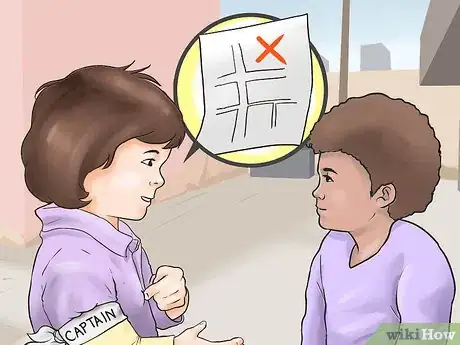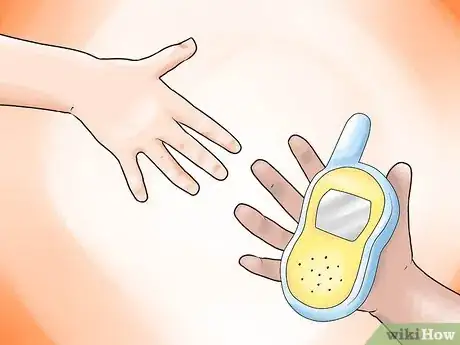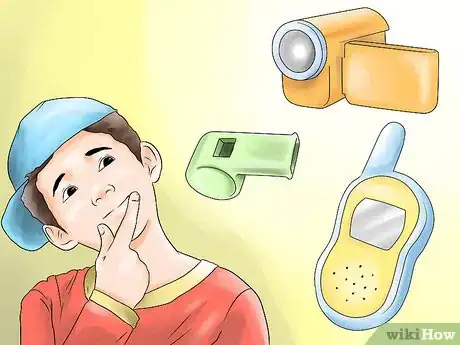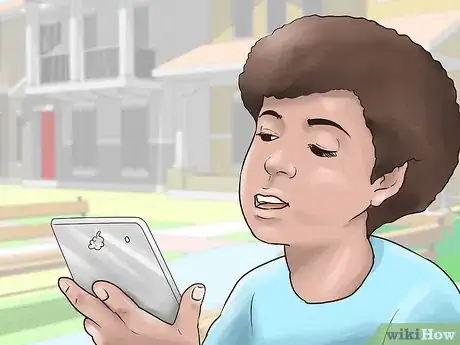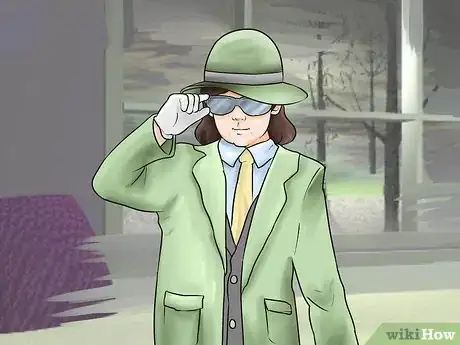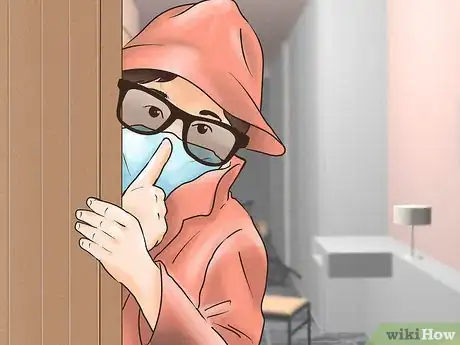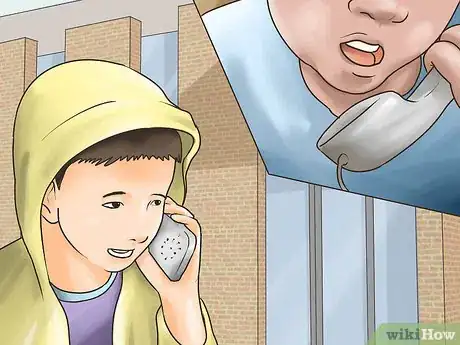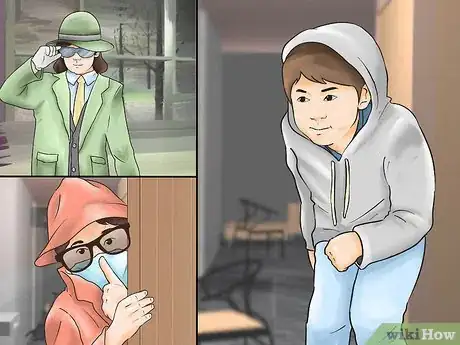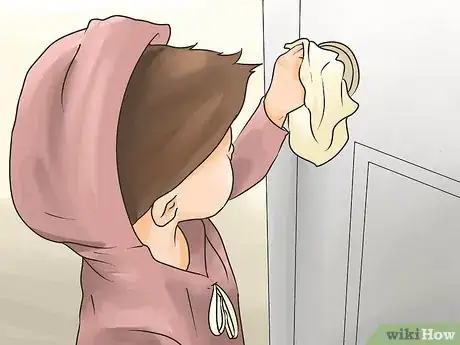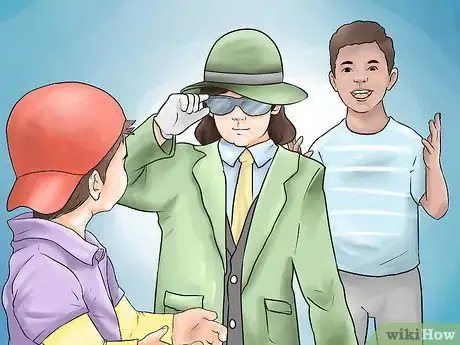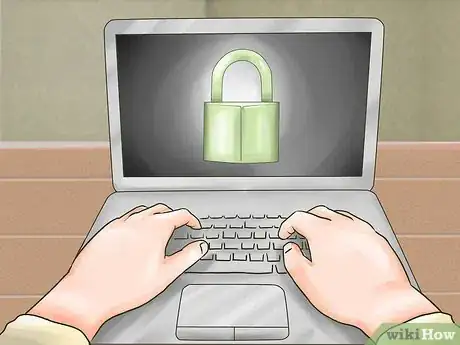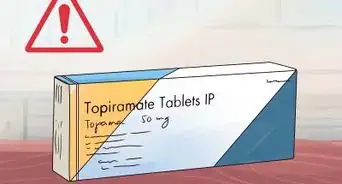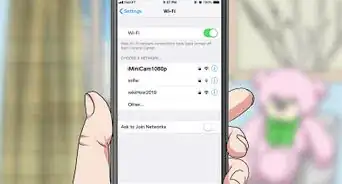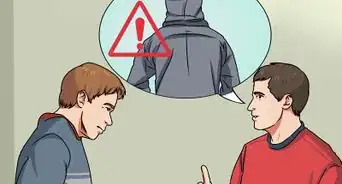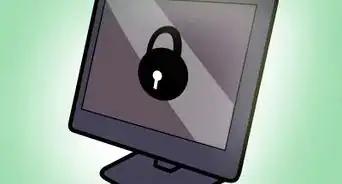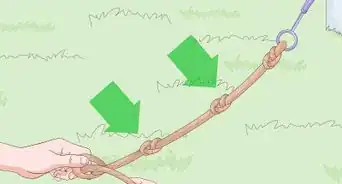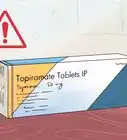wikiHow is a “wiki,” similar to Wikipedia, which means that many of our articles are co-written by multiple authors. To create this article, 361 people, some anonymous, worked to edit and improve it over time.
wikiHow marks an article as reader-approved once it receives enough positive feedback. This article received 49 testimonials and 88% of readers who voted found it helpful, earning it our reader-approved status.
This article has been viewed 845,633 times.
Learn more...
Spying may be fun and exciting, but it's not easy! A good spy kid is hard to find. To be the next undercover agent, you'll need to get trained, create a team, learn mission protocol, hide the evidence and enhance your spying technique through various spy activities!
Steps
Creating a Spy Team
-
1Organize your team. Spying is safer and more fun with two or more people. Your teammates can back you up and can help complete your mission faster (with the right group, of course!). If you decide to be alone, that’s okay, too. Secrets can definitely be kept a lot easier when it’s just you.
- If you do decide to form a team, you should have one teammate who knows a lot about technology, such as computer shortcuts and knowledge of gadgets. The tech member can also make maps, plans, charts, and notes about the secret mission.
- Being clever doesn't hurt either. If you have a friend that’s great at thinking outside of the box and is quick on his or her feet, add them to the mix.
- Sometimes it's good to have a teammate that's strong, like for heavy lifting or hard tasks that involve strength. But don't let just anyone into your team; you need skilled spies, not grunt men.
- Having a younger sibling is always helpful too, because they can usually out cute any foe you might come across- or to infiltrate the enemy's hideout, because they are smaller and a lot more trustworthy because of their age.
-
2Set up a hierarchy for your team. Make sure each of your members has a purpose. They'll feel like they're a valuable part of the team, too, if they have a specific role. Here’s the basic positions you should have filled:
- A captain who is in charge of the team
- A vice captain to help the captain make decisions and take their place if they are ill
- A tech person in charge of the computer, surveillance equipment, and maps, etc.
- A few general spies who go out in the field to do most of the spying
- Make sure there are other spies at the base ready to back you up on your mission. Also, have another spy at a computer to write things down and get and record information.
Advertisement -
3Equip your team members with your spy gadgets. Remember, being a spy team means helping each other through thick and thin. If you have a few gadgets to your name, dish them out evenly. The more successful your team is, the more successful you and the mission are.[1]
- Everyone needs a way to report back to the base. It could be a cell phone, a walkie talkie, or even just a whistle – if they get in trouble, someone can come running. They also need whatever devices would help them debunk their case, like a camera.
-
4Get the right gear and equipment, too. For a successful mission, you need equipment. The bigger your team is, the more you’ll need communication devices, too. Consider taking the following with you on your next mission:[2]
- Intercoms
- Cell phones
- Video equipment
- iPods and other communication devices
- Walkie talkies
- Whistles
- Cameras
Training as a Spy
-
1Practice using your gadgets. Do several practice runs in a different location than the actual mission to test and get used to your gadgets and clothes. This way, you will know the shortcuts and limits of your equipment. It can also help you predict what problems will likely arise.[3]
- Make sure everyone knows how to use the devices and is comfortable with them. If someone doesn't like using the computer, for example, send them out into the field. You want them doing a job they like, after all.
-
2Dress the part. Two things to consider: you either want to go totally spy-worthy or totally incognito. It’s more fun to dress like a spy, but sometimes it makes more sense to blend in. Which is appropriate for your next mission?
- You might need special clothes like gloves and boots to make your missions possible. Wear dark colors, and don’t forget hats, too.
- If you don’t want to be suspected of being up to no good, wear your ordinary clothes. That way you’re just a few kids having fun.
-
3Learn to code data. Encrypt your written messages with a simple code. They can be as simple as substituting a letter for another or you can use numbers for letter or makeup entirely new symbols that correspond to the alphabet. An advanced method (and harder to decrypt) would be to flip the word backward and substitute the letters. You might even want to write the code in invisible ink.[4]
- Why is this useful? You don't want anyone figuring out your classified information, right? Should someone (like a pesky sibling) "accidentally" go through your stuff, you want them not to suspect anything. Or if they do suspect something, you want them to have no idea what they've seen.
-
4Practice escaping from places. A locked room? Not a problem. A tree? Easy. A crowded room? Don’t even worry about it. You and your spy team can escape from just about anywhere – including sticky situations.
- Never use elevators – if you get trapped in one, you’re trapped. Stairs allow for more exits.
- It will be easier to escape places (and to sneak into them) if you learn how to pick locks.
- Work on ways to talk your way out of things, too. Practice being confronted by a parent or someone with authority and use your sweetest words to talk your way out of it.
-
5Get used to talking in different voices. This could also help with disguising, especially if your mission is in public, you’re around people you know, and you need to talk to your team. If you can disguise your voice, no one will suspect it’s you.
- This will mainly be helpful if you're using cell phones or walkie-talkies. Code names are a necessity, too!
Establishing Mission Protocol
-
1Choose your mission. For example, you might figure out where your guardians hid something, figure out the password to a friend’s club, or find out which neighborhood dog has been dirtying your dad's prized lawn. There's no mission too small, either.
- Don't know of a mission? Keep your eyes and ears peeled. You'll hear someone complaining of something or talking about a problem they have they need solved. That's when your team can jump right in.
-
2Gather intelligence beforehand. Scout out the surroundings of your mission's location for any hiding spots or escape routes. Make a map and take notes, denoting where everyone will be posted and what they will do. Just like the Boy Scouts, you should always be prepared.[5]
- Make a backup plan or two. When plan A and B go terribly, terribly wrong, your team still knows how to handle the pressure with plan C. And be sure that whatever happens, everyone stays safe!
-
3Station each member at their posts. Each member should have a communication device, preferably with headsets, as to minimize noise. When everyone is ready, commence the mission. They all go to their spots and begin their career as a trained spy kid.
- Make sure they all know the rules. When can they go to the bathroom? When do they switch posts? At what time is everyone meeting back up and where?
-
4Don't be seen or heard. Have a good hiding spot for each member, such as a large tree, bushes, or boulders. Also, you can inconspicuously have a teammate casually stroll by, with a book or something in hand. Don't do this too much, though, or it will seem suspicious.
- If you're incognito, dressed as a normal kid, make sure you're acting normal, too. What would a normal kid do at the park? He or she probably would make noise, laughing and playing around. You can also be suspicious by being too quiet.
-
5Cover your tracks. Make sure you and your teammates don't leave anything behind. Destroy any footprints on dirt or mud, (and destroy any accidental fingerprints if you notice some). All papers at the scene should be recycled and definitely no clothing or anything else personal left for curious eyes to find.
- Cover your digital tracks, too. Delete any text messages, emails, or phone calls made about the mission. Though it's likely no one will see these, it's always better to be safe than sorry.
-
6Rendezvous after the mission with your team. There should be a meeting place after the mission to gather information from each team member. The team should then brainstorm, determining if another mission is necessary or if this one can be considered case closed.
- If members don't show up, return to your posts and try to find where the missing member is. If necessary, get out of spy mode and go looking for them openly. Have one or two people stay at the base in case they come back on their own.
Keeping Your Spying a Secret
-
1Store any information in a secure place. The last thing you want is all of your retrieved intelligence and data compromised by a non-spy discovering what you’ve found. Make sure you put it in a place no one will think of to go but you. But you also want a place that's easy to remember.
- Try a locked box or a password-protected computer.
- Are there are secret locations in or around your house, like under a loose floor board, that no one knows about but you? This also makes good storage space.
-
2Act naturally around those you’re “spying” on. Don't avoid the enemy; if you do, they'll think something's up. Try your best to act normal and make sure you meet as if nothing happened.
- If you've discovered information that they need to know (like which dog is digging up the yard), present this information as calmly and as casually as possible. You didn't go on a secret ops mission with your team – you just happened to be walking by when you saw Mr. Fluffy doing the deed.
-
3Have an alibi ready. If the enemy finds out what you are doing or sees you spying, make sure you have a backup plan to explain what you’re doing there. Or if you get asked later where you were while you were gone, be ready with details. You sure don't want to be caught spying!
- Keep it as close to the truth as possible. Say something like, "I was there out with my friends (your team) and we were playing a game in the park. It's like hide and seek, but advanced. It's too difficult to explain; there are lots of rules. You wouldn't like it anyway.
-
4Do not tell any non-spies what you’re up to. Only friends who are being initiated into the program should be told about your activities. Otherwise, keep it secret and low key. Some might be jealous and some might blab your secret. The fewer people who know, the better.
- Be careful in initiating in new team members. Make sure they're trustworthy and up to the challenge before they become a spy kid with you. Your team needs to be all top-notch, honest, talented spies.
Community Q&A
-
QuestionWhat do you carry all your equipment in? Do you take it with you or do you leave it?
 Community AnswerIf you're a girl, a purse or backpack should work; not to big though. If you're a boy, a backpack that is not too big to be noticed is ideal. Equipment should be small, such as a phone or video recorder that can be put in your pocket, a small journal, a mini pencil, and a walkie talkie that can be clipped to a bracelet, shoe, or pants.
Community AnswerIf you're a girl, a purse or backpack should work; not to big though. If you're a boy, a backpack that is not too big to be noticed is ideal. Equipment should be small, such as a phone or video recorder that can be put in your pocket, a small journal, a mini pencil, and a walkie talkie that can be clipped to a bracelet, shoe, or pants. -
QuestionWhat if your friends or friend say that being a spy kid is childish?
 Community AnswerTry to find kids you think would really like to be a spy. Test them (or test your spy skills by spying on them) to find out if they're trustworthy, and that you can work comfortably with them. They'll take it seriously enough.
Community AnswerTry to find kids you think would really like to be a spy. Test them (or test your spy skills by spying on them) to find out if they're trustworthy, and that you can work comfortably with them. They'll take it seriously enough. -
QuestionHow do you make spy gear?
 Community AnswerYou can read How to Make Spy Gear for details. If you don't want to make it, there are online stores and toy stores that will sell spy gear for kids, such as walkie talkies, spy goggles, etc.
Community AnswerYou can read How to Make Spy Gear for details. If you don't want to make it, there are online stores and toy stores that will sell spy gear for kids, such as walkie talkies, spy goggles, etc.
Warnings
- Have a route to go to if the mission fails.⧼thumbs_response⧽
- Make sure that everyone in your team is happy with the hierarchy otherwise you may lose some people from your team.⧼thumbs_response⧽
- It's a good idea to have a cover story, for example: Oh we were just playing hide and seek.⧼thumbs_response⧽
Things You'll Need
- Clothes that blend in
- Flashlight
- Gadgets (cameras, secret microphones, small voice recorder tools, etc.)
- Maps of the area
- Gloves for when touching things
- Mission log (a notebook to write down anything suspicious)
- A base (such as a tree fort, place in the woods, or school playground when nobody is around. It could even be your bedroom!)
- Communication device (such as cell phone, walkie-talkie, messengers, phones, etc.)
- Tweezers for getting clues in tight spots
- Containers (ex: sandwich bags) for storing clues without contamination
- A camera to take pictures of clues
- A book, newspaper, iPod, etc. (something that you can use so you don't look suspicious.)
- Hidden areas around the enemy.
- A disguise kit (change your look so enemies don't recognize you)
- Locks to keep others out of top secret stuff
- Binoculars to see if anyone is secretly watching!
- Get other gadgets ( ex: night binoculars, movement mode )
References
- ↑ https://www.mumsnet.com/child/spy-secret-agent-party-ideas-games-and-food
- ↑ https://www.starwalkkids.com/toys/tech/the-best-spy-kit-for-kids
- ↑ https://www.seeker.com/top-10-spy-tactics-1766277663.html
- ↑ http://learnincolor.com/secret-spy-codes-for-kids.html
- ↑ http://usscouts.org/advance/boyscout/bsoathlaw.asp
About This Article
To be a spy kid, practice techniques like gathering intelligence, writing messages in code and escaping from locked rooms. Apply your spy skills by choosing a mission, such as figuring out a password or finding out who stole a particular object. Assemble a spy team, and assign each member a specific role based on their strengths. For example, make somebody the tech expert if they know a lot about computers and electronics. To find out more about how to be a spy kid, along with spy gear and gadgets to help you in your mission, read on.

